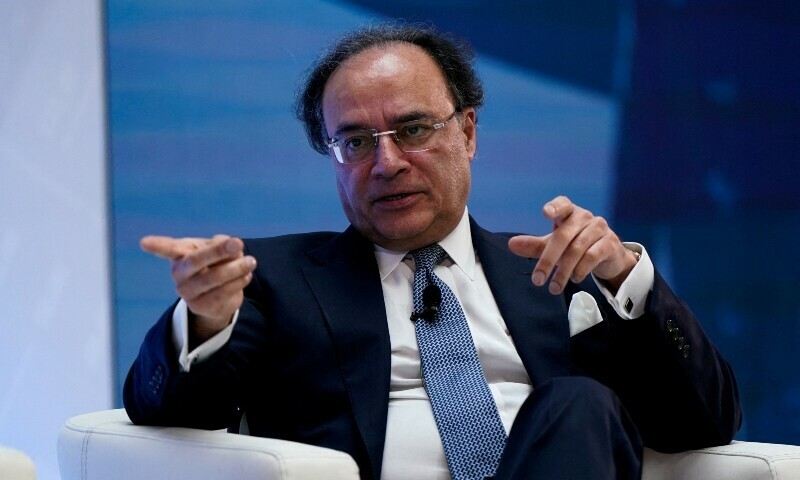By Staff Reporter
ISLAMABAD: Finance Minister Muhammad Aurangzeb said on Monday the government has planned a “strategic” budget for fiscal year 2025-2026, promising bold steps to reshape an economy battered by import reliance and fiscal instability.
Speaking at an event in Islamabad, Aurangzeb stressed that the budget, set for announcement on June 10, would go beyond mere numbers to chart a transformative course for an economy only sustained on bailouts from the International Monetary Fund (IMF).
The budget’s unveiling was delayed from its original timeline as high-level policy discussions with the IMF, which kicked off in Islamabad on May 19, remain unresolved. Political leadership repeated emphasised the need to break free from the country’s recurring boom-and-bust cycles. “We go running back to the lenders as the last resort,” Aurangzeb said, adding, “All of us have had enough boom and bust cycles.”
Pakistan, in its 24th IMF program, is racing to secure the next slice of the Extended Fund Facility (EFF) and a $1.3 billion Resilience and Sustainability Facility (RSF). Talks, underway since May 19, delayed the budget’s rollout.
The minister alleged external forces tried to derail the IMF programme. “No stone was left unturned to stop this meeting,” he said, though he added, “Our case was decided on merit.”
The minister framed the upcoming budget as a pivotal shift. “We are working on a strategic budget instead of just making the math work,” he said. “The DNA of the economy has to change, and therefore we are going to bring some bold measures during the budget for FY2025-26.”
He reiterated that the document must “provide the strategic direction of where the economy is, and where it is heading,” rather than serving as a routine accounting exercise.
The minister’s remarks come against a backdrop of heightened regional friction, with Pakistan proposing a Rs2.8 trillion defense budget in response to what Aurangzeb called a “war-like situation” with India. “These are very tense moments,” he said, commending the unity of Pakistan’s armed forces and political leadership in countering aggression. “The entire nation has rightly celebrated the way our armed forces and political leadership have stood up against the aggression,” he added. The hefty defense allocation underscores the government’s focus on national security even as it wrestles with economic pressures.
On the economic front, Aurangzeb doubled down on the need for structural reforms to address the chronic reliance on imports, which has fueled foreign exchange shortages and balance-of-payments crises. “We have achieved macroeconomic stability in yesteryears and in the previous decades as well, but we have squandered the opportunity,” he said, warning against the pitfalls of “consumption-led growth” that triggers a “sugar rush” of liquidity and subsequent busts.
The government is pressing ahead with a multi-pronged reform agenda, including modernising the taxation system, digitising the Federal Board of Revenue (FBR), and rightsising the federal government. “It’s important that whatever we are doing—including the rightsizing of the federal government—we are taking it in waves rather than a big bang approach,” Aurangzeb said.
He also outlined plans to simplify tax filing for the salaried class, noting that “70-80% of the salaried class don’t necessarily hold equity or income portfolios.” The goal, he said, is to reduce filing requirements to “nine items, five on the wealth and four on the income tax side” by the end of September.
Debt management emerged as a bright spot, with Aurangzeb revealing that debt servicing costs had dropped by Rs1 trillion in the current fiscal year. “Next year, we are going to restructure and reorganize our debt management office along modern lines in terms of international best practices,” he said, signaling a push toward more efficient fiscal governance.
The minister was candid about setbacks in reforming state-owned enterprises (SOEs). “This is one area where we did not do well last year,” he admitted, but pledged to accelerate efforts, including the relaunch of the Pakistan International Airlines (PIA) transaction. “The PIA transaction has been relaunched, and I’m optimistic about its completion,” he said, offering a glimmer of hope for a sector that has long weighed on public finances.
Last year, Aurangzeb’s first budget—a Rs18.9 trillion package—drew praise from analysts for aligning with IMF guidelines. Total revenue for the current fiscal year was pegged at Rs17,815 billion, with net revenue of Rs10,377 billion after provincial transfers of Rs7,438 billion, marking a 48.7% jump from FY2023-24. Widening the tax base remains a priority, with Aurangzeb stressing during last year’s presentation that the focus was on avoiding additional burdens on existing taxpayers.
Looking ahead, Aurangzeb expressed cautious optimism about Pakistan’s economic trajectory. “Our economy has crossed the $400 billion level. This shows we’re moving in the right direction,” he said. Yet, he cautioned that reaching a $3 trillion economy by 2047 hinges on tackling “two existential issues”—population growth and climate change. A recently inked 10-year Country Partnership Framework with the World Bank, he noted, prioritizes these challenges, with four of its six pillars addressing climate and population dynamics.
Copyright © 2021 Independent Pakistan | All rights reserved




